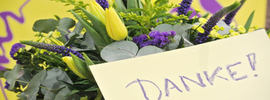8. September 2006 - International Harald Tribune
Tall mission for pope as he returns to Germany
REGENSBURG, Germany Benedict XVI, who may be the last European pope for some time, arrives in Germany this weekend to visit home. He owns a house here, from his days as a theologian in this ancient Bavarian city. His older brother still lives here. Their parents are buried on a grassy hilltop above Regensburg, the majestic spires of the city cathedral and the Danube.
But this will be no mere sentimental journey. Even here in Bavaria, Germany's conservative and Catholic heartland, it will be in some ways a survey of the shrunken remnant that is the European church - and the perhaps impossible task this new pope faces in rebuilding it. In 1979, the year that Benedict's popular predecessor John Paul II was elected, regular mass attendance in Germany was 30 percent. Today, it is under 15 percent.
"In the Western world today we are experiencing a wave of new and drastic enlightenment or secularization, whatever you want to call it," Benedict told a group of German reporters last month, in a rare public papal interview. "It's become more difficult to believe."
That is a fact, long acknowledged by the church. The faith's new heart beats in the third world: in Africa, Asia and South America.
But Benedict - the product of the best and worst of Europe, an elder of its lofty universities and a conscript in the Nazi army - was chosen last year after John Paul's death, in many ways, to shore up faith on a continent that is less Christian, more Muslim and, critics say, spiritually adrift. He is expected to address the issue in his five days here, and some people, at least, are ready to give him a hearing.
"He wants to present a positive image of the church, not an image that excludes people," said Florian Meier, a 24-year- old theology student at the University of Regensburg. "He doesn't just want to talk about all the negative things, like abortion and contraception."
In Meier's case, he acknowledged, the pope will be preaching to the converted - and that, in fact, is a key part of Benedict's long-term strategy to save the faith in Europe: Focus on believers, but work to make the church otherwise attractive by stating what life in the church can bring, rather than what it excludes. The effort, for Meier, has already dispelled the notion that the Catholic church is a hopeless relic.
"What the pope has done is make it O.K. to say, 'Yes, we are Catholic; yes, we go to church,'" said Meier.
While the decline of the church itself is undeniable, many studies show a rising interest in Europe in faith more generally. Pilgrimages are newly popular. A recent British television series on men entering a Catholic monastery attracted millions of viewers. The funeral of John Paul II also drew millions, and Benedict himself attracts hundreds of thousands every time he says a public mass - without, though, any increase in ordinary church-going.
"The challenge for anybody in religious leadership is what they do in that oddly paradoxical combination of circumstances, which is the continuation of decline, but a rise in interest," said Grace Davie, a professor of the sociology of religion at the University of Exeter in England. "I would not presume to say whether the pope is doing a good job or not. But I would say that the opportunity lies in capturing the moment."
And so, this trip to his home turf provides a particularly relevant glimpse into the problems of the church, what the pope intends to do about them and what early strides he might be making.
Inevitably, so far, he has earned admirers and detractors in the country that knows him best. Certainly, the election of this German pope, long an unyielding voice in the church, was not universally lauded among German Catholics, many who worried he would not make an ideal bridge between an ancient faith and a modern, secular nation.
Conservative, with more brains than charisma, Joseph Ratzinger is still famous here among theology students for his popular, incisive seminars and for his epic battles with liberal theologians like Hans Küng. The first fear among many, both students and Germans generally, was that he would be a reactionary.
But Germany has warmed to him, and in Regensburg the streets now ripple with the Vatican flag. Part of that appeal has been Benedict's quiet and intellectual style, which, while decidedly not compromising on the faith, has largely sought to avoid strident condemnation on moral issues.
Though he condemns homosexuality and same-sex marriages, and rarely pulls punches on church doctrine, he often prefers to emphasize more God's purpose in marriage between a man and a woman. His first encyclical was on love - a choice that surprised and heartened Ulrike Reis, 25, who is studying to be a teacher. "As soon as he starts to say, 'don't, don't, don't,' Germans will close their ears," she said.
That is a conscious strategy, aimed at not alienating the secular world as the pope articulates a vision of Catholicism as appealing as possible.
A second prong of the Vatican's strategy is to cultivate those who already believe, in effect to shore up what Benedict calls a "creative minority" to keep the church steady.
And so his speeches address more the faithful than the culture at large, pleasing believers in search of nourishment and frustrating journalists in search of news. It also accounts for his emphasis on back-to-basics Catholic practice, visiting shrines, especially to the Virgin Mary, and encouraging activist lay groups. There is only one major secular event on Benedict's itinerary in his six-day visit: a speech at the university here on Tuesday.
"If you look at the Catholic Reformation, the state of the church in 1520, how did the church pull itself together then?" asked Philip Jenkins, professor of religion studies at Penn State University. "It was not to focus on every little political and social issue," he said. "It was a new focus on sanctity, new religious orders and, above all, a focus on Mary. And their view, I think, is: 'If we do it again, maybe the 21st century will look more like the Catholic Reformation.'"
Experts say too that the battle for faith will not be won by only accenting the positive. John Paul was one of the best-loved people on earth, but still the church shrank.
"Many people aren't finding a home in the Catholic church - because of the lack of a role for women, because of the lack of democracy," said Christian Weisner, spokesman for We Are Church in Germany, a liberal group. "In theory, the pope could do something positive about it; in practice, he won't."
Then there is the reality that the church, to many, simply seems irrelevant, given all the modern world has to offer. Ferenc Acs, 35, a Ph.D. candidate in neuropsychology at Regensburg, was baptized a Catholic and said he was relieved that Benedict "seems to be more moderate than expected."
But Acs did not expect much change in church doctrine he disagrees with. He does not expect to return to church. And he had no plans to attend the pope's mass next Tuesday. "If you're going to hike five kilometers for a spectacle," he said, "I prefer rock concerts."
Mark Landler reported from Regensburg; Ian Fisher reported from Rome.
Zuletzt geändert am 09.09.2006



 Wir sind Kirche-Advents-Kalender 2025
Wir sind Kirche-Advents-Kalender 2025